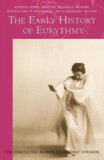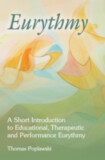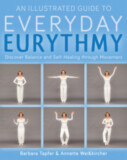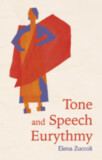Eurythmy as Speech Made Visible
Speech Eurythmy Course (CW 279)
Foreword by Marie Steiner-von Sivers
Introduction by Coralee Frederickson
Translated by Matthew Barton
- Publisher
Rudolf Steiner Press - Published
12th November - ISBN 9781855846654
- Language English
- Pages 512 pp.
- Size 6" x 9.25"
15 lectures, Dornach, June 24 – July 12, 1924 (CW 279)
With these fundamental lectures on speech eurythmy—given just months after his course “Eurythmy as Visible Singing”—Rudolf Steiner completed the foundations of the new art of movement. In connecting to the centuries-old esoteric and exoteric Western traditions of “the Word”—the creative power in the sounds of the divine-human alphabet—he gave it concrete form and expression in the performing arts, in education, and for therapy. Although aimed primarily at the professional concerns of eurythmists who perform, teach, or work as therapists, the lectures offer a wealth of suggestions and insights to anyone interested in the arts.
For this new edition—freshly translated by Matthew Barton and introduced by Coralee Frederickson—the original shorthand transcripts have been compared exhaustively with typed records and the notes of course participants. The notes included numerous sketches of movements, gestures, and choreographies, many of which have been reproduced here to complement the text.
Also featured is an appendix comprising facsimiles and transcripts of Rudolf Steiner’s preparatory notes, programs of the eurythmy performances given during the course, and accounts by Steiner published in the Anthroposophical Society newsletter.
Finally, this new translation also includes recollections by course participants, supplemental sketches of eurythmy forms and movements, Marie Steiner’s original foreword, and thirty pages of color plates, featuring blackboard drawings and eurythmy forms.
Eurythmy as Speech Made Visible is a translation from German of Eurythmie als sichtbare Sprache: Laut-Eurythmie-Kurs, Rudolf Steiner Verlag; revised and expanded edition, 2014 (GA 279).
Rudolf Steiner
Rudolf Steiner (b. Rudolf Joseph Lorenz Steiner, 1861–1925) was born in the small village of Kraljevec, Austro-Hungarian Empire (now in Croatia), where he grew up. As a young man, he lived in Weimar and Berlin, where he became a well-published scientific, literary, and philosophical scholar, known especially for his work with Goethe’s scientific writings. Steiner termed his spiritual philosophy anthroposophy, meaning “wisdom of the human being.” As an exceptionally developed seer, he based his work on direct knowledge and perception of spiritual dimensions. He initiated a modern, universal “spiritual science” that is accessible to anyone willing to exercise clear and unbiased thinking. From his spiritual investigations, Steiner provided suggestions for the renewal of numerous activities, including education (general and for special needs), agriculture, medicine, economics, architecture, science, philosophy, Christianity, and the arts. There are currently thousands of schools, clinics, farms, and initiatives in other fields that involve practical work based on the principles Steiner developed. His many published works feature his research into the spiritual nature of human beings, the evolution of the world and humanity, and methods for personal development. He wrote some thirty books and delivered more than six thousand lectures throughout much of Europe. In 1924, Steiner founded the General Anthroposophical Society, which today has branches around the world.








